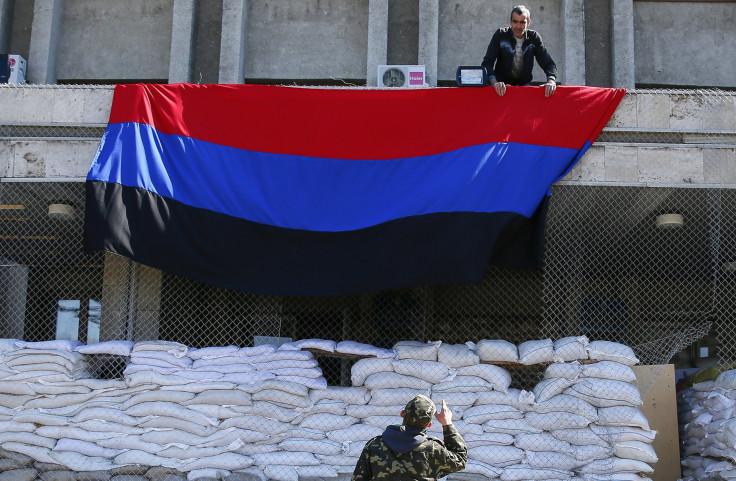Ukraine Crisis Could Have Economic Impact Far Beyond The Region

Broad U.S. economic sanctions haven’t quelled Russia’s aggression in Ukraine. On Friday 38 people were killed in the city of Odessa.
The crisis continues to expand from a local problem to a global issue. Further sanctions and conflict would bring uncertainty to global markets and may pull down a slowly recovering Europe while jeopardizing billions of dollars from multinational companies.
The unrest could have consequences far beyond the region. “We’re going to have to take some pain for this,” said Robert Kahn, an international economist at the Council on Foreign Relations.
“These are very, very hard events to quantify,” he said.
If the situation escalates further, which he expects it will, global markets will react.
“Until now, markets have been sanguine about the standoff between Russia and the U.S., and seem to believe that the effects for the most part will be localized,” Kahn said.
Currently, global interest rates are still low from a long-term perspective, while Europe is in the slow, painful process of rescuing its own economy.
For Russia and Ukraine, the future looks gloomy. Despite help from a $17 billion bailout from the IMF, the Ukrainian economy is going through a balance of payments adjustment, and even if the crisis dissipates soon (which doesn’t seem likely), the government is looking at tight spending this year.
Meanwhile, the threat to Russia’s economy is “greater than many think,” according to Julian Jessop, chief global economist at Capital Economics. Its stock market is down 20 percent this year, and the IMF recently downgraded its forecast for GDP growth from 1.3 percent to 0.2 percent for 2014.
But the Russian economy affects more than one country. If the situation worsens, the European Union could be at risk.
“A third of [Europe’s] gas comes from Russia. It’s serious,” said Mark Weisbrot, co-director of the Center for Economic and Policy Research.
Though Europe does have the advantage of alternate trade partners and the use of strategic reserves, making a transition amid high oil prices would be challenging.
“It would be fairly easy for that recovery to be set back, and that has an impact on the whole world economy,” said Weisbrot, explaining that the region’s recurring crises since 2010 have taken billions and billions out of global markets.
Russia and Ukraine are important suppliers of energy and other commodities such as palladium, nickel, titanium and grain. The pain could be felt in supply chains of companies that use these materials, or other manufacturing in Russia.
“It’s a very dangerous situation for businesses particularly,” said Matt Lasov, global head of advisory and analytics at Frontier Strategy Group, a consulting firm for multinational companies.
Companies based in Europe will have problems with their supply chains, especially those with manufacturing plants in Russia. Local partners won’t be able to access finances, exports could stall, all while European consumers feel the pinch of high oil prices.
Automakers in Germany would be heavily affected, for example, since much of their manufacturing takes place in Russia. It’s no surprise that Angela Merkel and German businesses are urging the U.S. to stop the sanctions.
“More sanctions would put Russia into a deep recession, so whether you’re selling consumers goods, technology or in the financial sector, it’s not good,” said Lasov.
He also expects that if the situation gets more serious, multinational companies might pull out of the country, “which they probably wouldn’t do in an ordinary recessionary situation,” he said. Companies didn’t pull out of Russia during a 2009 recession that contracted the economy by 10 percent. But that situation didn’t have the same ugly political implications as the Ukrainian crisis.
Consequently, even U.S.-based companies with operations in the country, such as Caterpillar, Citibank and Pepsi, may feel the pressure.
But economists say the American economy won’t be as hard-hit as its counterparts overseas. Indeed, uncertainty in global markets could boost demand for U.S. government bonds, along with other safe havens such as German, Japanese and U.K. bonds, along with commodities like gold.
“Russia would remain the biggest loser on economic terms, as well as politically -- an invasion would drive other former satellites to build closer ties with the West.”
Some economists think Asian economies could benefit as Russia seeks new trade partners. But so far, China has been careful about its public statements on the matter.
Though the sanctions haven’t forced Russia to change its ways, at least for now, they’ve certainly made a dent economically.
“They’ve worked in the sense that they have imposed pain, the Russian economy is in recession,” said Kahn.
“The hopeful last thing is that the U.S. sanctions are also sending a message to other places where territorial disputes are at the fore,” he added.
© Copyright IBTimes 2024. All rights reserved.












